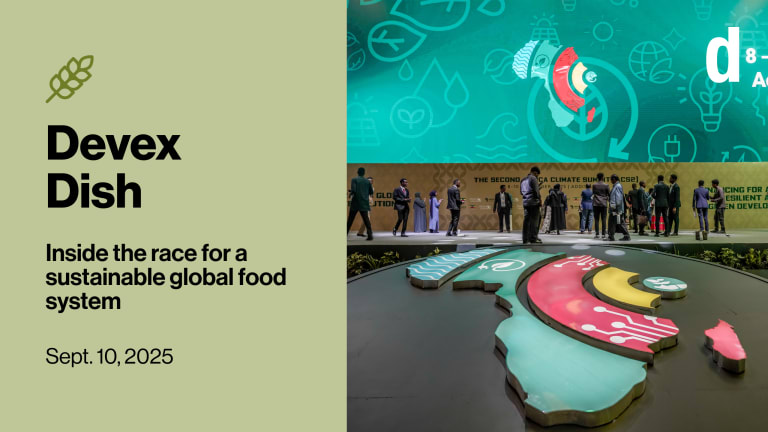
As momentum builds around the United Nations’ 2021 Food Systems Summit, some in civil society say efforts to include farmers and food producers in event preparations are not going far enough.
The first-ever summit is designed to unite multiple sectors around food systems transformation in the final decade of the 2030 Sustainable Development Goals. It will take place on the sidelines of the U.N. General Assembly in New York City in September, while a pre-summit gathering in Rome during July aims to galvanize new commitments and mobilize new financing and partnerships.
While an estimated 690 million people are hungry — a number that has been on the rise since 2014 — and agriculture continues to contribute to and be adversely affected by climate change, organizers hope the empty supermarket shelves and supply chain disruptions caused by COVID-19 will further demonstrate the urgent need for worldwide reform.
“I’ve never felt that ending hunger was in our grasp more than it is now. The number 690 million — yes, it's going up, but it’s still pretty low compared to where it was when I started in this business,” said Lawrence Haddad, head of the summit’s “action track” focused on ensuring access to safe and nutritious food for all. “The things that seemed unimaginable a year ago are now imaginable.”
In addition to Haddad’s, summit work is split between four other tracks: shifting to sustainable consumption patterns; boosting “nature-positive production”; advancing equitable livelihoods; and building “resilience to vulnerabilities, shocks, and stress.” For Haddad, the summit is exciting because it brings together communities that have traditionally operated in silos.
“I’ve never talked to so many climate people in my life. I’ve never talked to so many resilience people in my life. … We’ve been operating in a multiverse. And now these walls between the multiverse are breaking down and you're thinking, ‘Yeah, we can produce nutritious food in a way that is affordable, that is green, that generates decent work and makes a resilient food system,” said Haddad, who is also executive director at the Global Alliance for Improved Nutrition.
“I’ve never felt that ending hunger was in our grasp more than it is now.”
— Lawrence Haddad, executive director, Global Alliance for Improved NutritionA series of dialogues
Action track leaders, who are volunteers, meet each week to ensure that solutions being pursued by the various tracks are not in conflict. Each track is hosting a series of dialogues to solicit feedback from U.N. organizations, NGOs, the private sector, and the public. Haddad compared how tracks are taking in ideas to “drinking from a fire hydrant.”
“It’s our job as action track chairs to create an orchestra out of a cacophony,” Haddad said. “The doors are open for good ideas that have impact, and we’re looking from everywhere.”
Before the summit, Haddad said he expects more than 80 countries to hold national dialogues to determine domestic priorities for food systems reform. These “independent dialogues” are being led by the International Fund for Agricultural Development and can be held by anyone, anywhere in the world.
Part of our The Future of Food Systems series
Find out how we can make food fair and healthy for all. Join the conversation using the hashtag #FoodSystems and visit our The Future of Food Systems page for more coverage.
IFAD is using its global presence and relationships with farmers and Indigenous peoples’ organizations to spread the word that input is wanted, said Hélène Papper, communications director at IFAD. Through its country offices and technical experts, IFAD will engage food producers to make sure that they know about the summit and that they — and anyone — can hold dialogues, with feedback to be submitted to organizers afterward.
“It is important to have voices of people directly with whom we work at the heart of the next steps going forward,” Papper said. “If we don’t do that, if we don’t give them a voice, then we can’t bring them on board. And so whatever solutions, whatever policies, whatever politics are then voted upon at a higher global level won’t necessarily resonate with the populations, so we will not see change.”
An outside company has been hired to “synthesize” the feedback and outcomes of the independent dialogues into common themes, proposed actions, and potential solutions, Papper said.
Fears of corporate influence
But for some civil society activists, the opportunity to provide input through pre-summit dialogues doesn’t obscure the fact that corporate interests can influence the summit agenda.
The Civil Society and Indigenous Peoples’ Mechanism for Relations With the UN Committee on World Food Security, or CSM, has publicly objected to the way the summit process is being run. The group issued an open letter listing a series of concerns to be addressed if it is to participate.
These include “Shifting away from corporate capture and re-grounding in individual and collective Human Rights and the experiences and knowledge of the people and Indigenous Peoples most affected,” “Transformation of corporate food systems,” and “Defending democratic public institutions and inclusive multilateralism.”
Although Agnes Kalibata — the U.N. secretary-general’s special envoy for the 2021 Food Systems Summit — has called it a “people’s summit,” CSM said its voice is not being sufficiently heard by organizers. Kalibata responded publicly to CSM’s concerns and has held multiple meetings with representatives. But the group said she has failed to address questions about corporate influence.
Nzira de Deus, co-coordinator of CSM’s youth working group, said any conversation about true food systems reform must be based on the principles of agroecology.
“We’re talking about big corporations. And it’s clear we have a cross-power imbalance in this space,” de Deus said. “I’m not sure if we’re going to participate, but of course we’re going to continue our debate on this, our articulation to create a space where we can bring our voice and bring our perspectives on all this process … and how we think the food system can work for all.”
Opinion: Global food systems can only be truly transformed with a people’s summit
Agnes Kalibata, the U.N. secretary-general's special envoy for the Food Systems Summit 2021, discusses how food systems can be transformed by sharing platforms, ideas, and learnings on a global level.
Jordan Treakle, who is part of the CSM liaison group for the Food Systems Summit, said CSM also objects to the summit being a process separate from the U.N. Committee on World Food Security, known as CFS. That body was set up — and is already structured — to solicit and organize feedback from all levels of the food system, from governments to local producers.
Treakle’s organization, the National Family Farm Coalition, was invited to participate in the U.S. national dialogue but did not do so because of concerns over the summit process. Treakle said those in civil society are worried that input from the dialogues “goes into a black box” and that the process is not transparent.
Treakle characterized CFS — a standing body that has been in its current form for over a decade — as “the most participatory and democratic” policymaking space at the international level for food and agriculture issues.
“We see the U.N. playing an important role in addressing these challenges, and we really think that rural communities need to come together and defend public institutions from corporate capture. So we are not trying to say that the U.N. is a bad thing or a threat, but the way in which the U.N. addresses these issues is really important. And we have a forum, CFS, to do that in a way that is more likely to lead to truly transformative policy tools,” Treakle said. “We should be strengthening the CFS rather than detracting from it with this Food Systems Summit.”
Update March 30, 2021: This article has been updated to reflect that the National Family Farm Coalition was invited to participate in a Food Systems Summit dialogue.
Visit the Future of Food Systems series for more coverage on food and nutrition — and importantly, how we can make food fair and healthy for all. You can join the conversation using the hashtag #FoodSystems.









